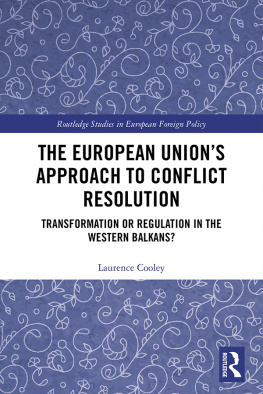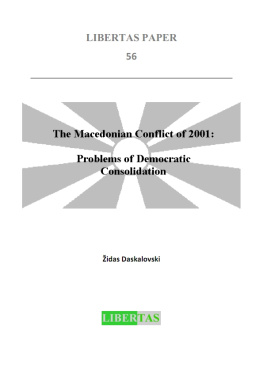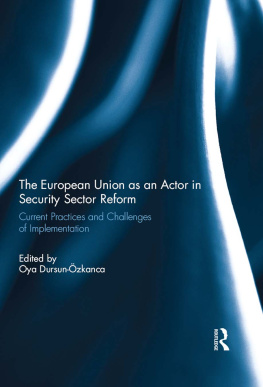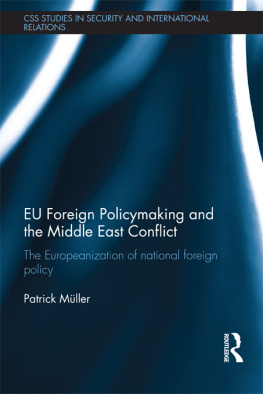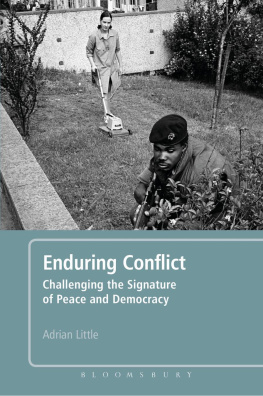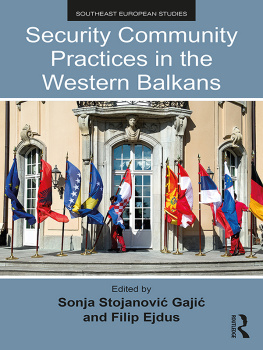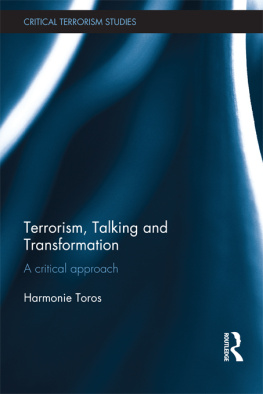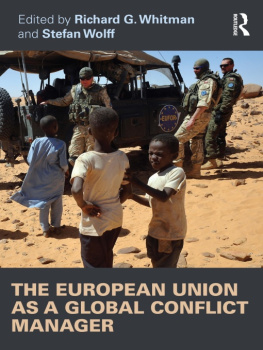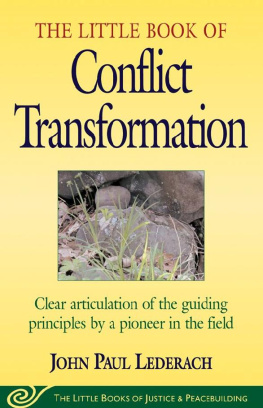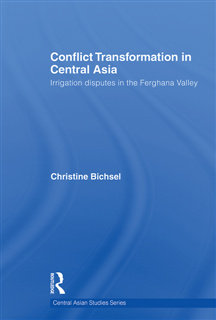The European Unions Approach to Conflict Resolution
This book investigates and explains the European Unions approach to conflict resolution in three countries of the Western Balkans: Bosnia and Herzegovina, Macedonia and Kosovo. In doing so, it critically interrogates claims that the EU acts as an agent of conflict transformation in its engagement with conflictaffected states. The book argues, contrary to the assumptions of much of the existing literature, that rather than seeking the transformation of conflicts, the EU pursues a more conservative strategy based on the regulation of conflict through the promotion of institutional mechanisms such as consociational power sharing and decentralisation.
Drawing on discourse analysis of documents, speeches, and interviews conducted by the author with European Union officials and policy-makers in Brussels and the case-study countries, the book offers a theoretically grounded, methodologically rigorous and empirically detailed analysis of EU policy preferences, of the ideas that underpin them, and of how those preferences are legitimised.
This book will be of key interest to scholars, students and practitioners interested in ethnic conflict and conflict resolution, the politics of the Balkans, and the external and foreign policies of the EU.
Laurence Cooley is a Research Fellow in the International Development Department at the University of Birmingham, UK. His research interests include the design of power-sharing institutions, the politics of the census in deeply divided societies, and the external policies of the European Union.
Routledge Studies in European Foreign Policy
Series Editors: Richard Whitman
University of Kent, UK, and Richard Youngs, University of Warwick, UK
This series addresses the standard range of conceptual and theoretical questions related to European foreign policy. At the same time, in response to the intensity of new policy developments, it endeavours to ensure that it also has a topical flavour, addressing the most important and evolving challenges to European foreign policy, in a way that will be relevant to the policy-making and think-tank communities.
EU Security Missions and the IsraeliPalestinian Conflict
Amr Nasr El-Din
The EU and Russia in Their Contested Neighbourhood
Multiple External Influences, Policy Transfer and Domestic Change
Laure Delcour
Europe and Iran
The Nuclear Deal and Beyond
Cornelius Adebahr
EURussia Relations in Crisis
Understanding Diverging Perceptions
Edited by Tom Casier and Joan DeBardeleben
The European Unions Evolving External Engagement
Towards New Sectoral Diplomacies?
Edited by Chad Damro, Sieglinde Gsthl and Simon Schunz
EU Induced Institutional Change in Post-Soviet Space
Promoting Reforms in Moldova and Ukraine
Ryhor Nizhnikau
The European Unions Approach to Conflict Resolution
Transformation or Regulation in the Western Balkans?
Laurence Cooley
The European Unions Approach to Conflict Resolution
Transformation or Regulation in the Western Balkans?
Laurence Cooley
First published 2019
by Routledge
2 Park Square, Milton Park, Abingdon, Oxon OX14 4RN
and by Routledge
711 Third Avenue, New York, NY 10017
Routledge is an imprint of the Taylor & Francis Group, an informa business
2019 Laurence Cooley
The right of Laurence Cooley to be identified as author of this work has been asserted by him in accordance with sections 77 and 78 of the Copyright, Designs and Patents Act 1988.
All rights reserved. No part of this book may be reprinted or reproduced or utilised in any form or by any electronic, mechanical, or other means, now known or hereafter invented, including photocopying and recording, or in any information storage or retrieval system, without permission in writing from the publishers.
Trademark notice: Product or corporate names may be trademarks or registered trademarks, and are used only for identification and explanation without intent to infringe.
British Library Cataloguing-in-Publication Data
A catalogue record for this book is available from the British Library
Library of Congress Cataloging-in-Publication Data
A catalog record has been requested for this book
ISBN: 978-1-138-48719-2 (hbk)
ISBN: 978-1-351-04348-9 (ebk)
Typeset in Times New Roman
by Wearset Ltd, Boldon, Tyne and Wear
Contents
I first started thinking about the issues addressed in this book more than ten years ago, but the research began in earnest with my PhD, undertaken in the Department of Political Science and International Studies at the University of Birmingham and completed in 2013. I am grateful to Thomas Diez, Tim Haughton and Michelle Pace for their excellent and enthusiastic supervision. Stefan Wolff and James Hughes acted as examiners and made valuable suggestions for deepening and sharpening my analysis. I am also grateful to the Economic and Social Research Council for funding my PhD. Roberto Belloni and Keith Breen, who taught me during an intellectually stimulating year at Queens University Belfast, first encouraged me to pursue a PhD and wrote the all-important references that enabled me to secure the funding.
I am grateful to all those members of staff and doctoral researchers in POLSIS who I had the pleasure of working alongside during the course of my PhD. A PhD community including Amin Samman, Andrew Futter, Charlotte Galpin, Dave Norman, Fran Amery, Jonna Nyman, Ken Searle, Liam Clegg, Liam Stanley, Linda hll, Mark McClelland, Martin Monahan, scar Pardo Sierra, Rhys Crilley and Stephen Hetherington deserve a special mention for their friendship, as does Fabienne Bossuyt for sharing much of the PhD journey with me. Dan Wincott and Stephen Bates provided valuable feedback on my proposed research as it developed during my first year at Birmingham. I am also grateful to the department and to the parents of the late Joshua Beeby for awarding me the departmental MA dissertation prize during my year of methods training, which proved an important stepping-stone on my PhD journey.
I was lucky to have the opportunity to spend time visiting the Centre for EU Studies at Ghent University and the Penn Program in Ethnic Conflict at the University of Pennsylvania during my PhD, and I am thankful to Jan Orbie and Brendan OLeary for facilitating these visits and welcoming me to their respective institutions. I am also grateful to all of my interviewees, who gave up their valuable time to contribute to this research, and to Lara Scarpitta for sharing her contacts. Thanks also to Jasmin Mujanovi, a real Balkans expert, for some productive sharing of ideas.
After finishing my PhD research, I found a new Birmingham home upstairs in the International Development Department, which has proved to be an excellent environment in which to further develop my research. Thanks go to Fiona Nunan, Heather Marquette, Tom Hewitt, Jonathan Fisher, Nicolas Lemay-Hbert and Paul Jackson, who variously helped me settle into the department and provided mentorship and guidance. Moving departments didnt allow me to escape Tim and Stefans questions about whether I had submitted a proposal for a book based on my PhD research, however, and I am grateful to them for convincing me that this was a project worth pursuing. Being awarded further ESRC funding, under the Future Research Leaders scheme, freed up time during which I was able to undertake additional empirical research and develop the manuscript for this book. My thanks go to the

